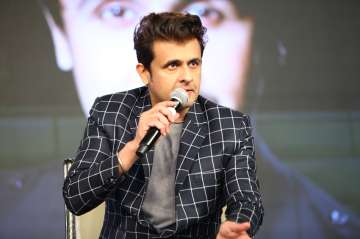Sonu Nigam on Vande Mataram: Why can’t we vote on grounds of work, instead of caste and religion
Sonu Nigam talked about diverse topics including questions raised around Balakot air strike and the 'keyboard warrior' attitude of youth on social media.

India TV is holding a mega conclave Vande Mataram which is focussed on Pakistan-grown terrorism. Many eminent guests like Union ministers Piyush Goyal and Ravi Shankar Prasad, former Army officers Gen VK Singh, Gen GD Bakshi graced the event and talked about most-asked questions and concerns regarding growing terrorism coming from the neighbourhood nation that has targeted India recently. Among the guests, popular playback singer Sonu Nigam also offered his valuable opinions on the matter. While talking to the host Saurabh Sharma, Nigam talked about a wide range of topics including Pakistani artistes ban in India to becoming a responsible citizen of India.
Sonu Nigam on Pakistani artistes ban in Bollywood
When asked about banning Pakistani artistes in India, Sonu Nigam said, “Banning Pakistan artistes is not the solution. Why did you call them at first place? Now you’re asking them to leave? Why are we changing our decisions like kids? We’re talking about a country that boasts of 1000 of years of rich heritage. Why to belittle the nation over these petty issues? We, on a whole, need to mature a great deal.”
He added, “If you’re sensible, you will stop all the cultural exchanges with Pakistan. You don’t need to be reminded about it every time. We don’t need to tell the film industry that ban the Pakistani artistes. It’s their (industry) responsibility to cease all such exchanges with Pakistan.”
Why to vote on grounds of caste and religion, asks Sonu Nigam
Sonu Nigam believes that we need to rectify our mindset to vote on the basis of the caste, religion and community. He said, “Why don’t we vote on the basis of the politicians’ performance? We should talk about bringing harmony in the country, instead of drawing lines on the basis of caste, creed and religion. We need to condemn our mentality to divide the communities and make them fight against each other.”
“Sensible people won’t question the Army when the country is dealing with such critical situations. We need to be in harmony, just like the musical instruments in the song. We should look back at the glorious past of India and tap into it make our country better than a nation who’s fighting over religion.”
Sonu Nigam's perfect answer to 'Keyboard Warriors' on social media
Sonu Nigam also raised an important concern at the Vande Mataram conclave, that was talked about many during the Balakot air strikes following the Pulwama attack. Soon after the ghastly terror attacks that killed around 40 CRPF personnel, many Twitter and social media users started raising war cries. Such netizens were termed to be the ‘Keyboard Warriors’ who have the limited knowledge about the proceedings of a war. Sonu Nigam slammed such people who were enjoying the growing tensions between India and Pakistan and urged them to act more rationally on social media.
He said, “It’s easy to cry war on the social media while sitting in the safety of your four walls. There were many fifteen and sixteen-year-old teenagers who demanded war on social media like nobody’s business. I would like to ask them, ‘what do you know about the war?’. Do they even know the aftermath of such battles? What about the economy that crumbles under such situations? And if war happens, these keyboard warriors will be the first one to complain about lack of jobs, food and other amenities on social media.”
Popular singer Sonu Nigam is one of the highest paid playback singers in Bollywood. He is also touted to be the Modern Rafi of Indian cinema. The 45-year-old singer has recorded songs in multiple languages including Hindi, English, Tamil, Telugu, Marathi, Bengali, Manipuri, Tulu, Assamese, Odia, Nepali, Maithili, Malayalam and others. In 2003, he won the National Film Award for Best Male Playback Singer for Kal Ho Na Ho. He also acted in several Bollywood films including Jaani Dushman and Kaash Aap Humare Hote.